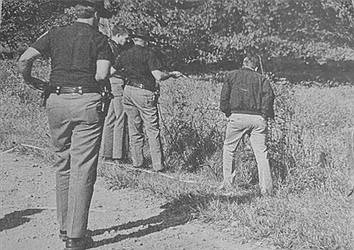Focus group shares knowledge with county
September 25, 2024 at 1:33 p.m.
Thursday night was another step in Franklin County’s bid to update the comprehensive plan in matters related to potential solar - or Alternative Energy Systems (AES) - installations, primarily the possibility of rezoning prime agricultural land in Bath and Springfield townships to accommodate the alternative sources.
Between 25-30 hand-picked residents with various ag expertise were on hand at the Brookville Library to help define future acceptable uses for county parcels zoned Agricultural-1 or Agricultural-2. Leading the discussion were members of an AES work group put together by the area plan commission over the summer.
The group’s plan for the evening consisted of announcing a general timeline for the process, breaking out into smaller groups to discuss four goals/objectives as chosen by the AES group, a presentation of those findings and finally open discussion to spotlight the most common concerns or bring up additional ideas.
Purdue Extension Educator Veronica Bullock and David Mannix made introductions and laid out the evening’s agenda. Several in the room were active farmers or farm owners but ag-related businesses were represented, as well as supporting government agencies and a few elected officials. Bullock said the discussion was to be county-focused and not a forum to veer off into other topics like the upcoming general election.
The four stated goals had their own corner of the conference room: 1) Family & Young Farmer Retention led by Traci Robinson; 2) Diversify the Economy in Ag Districts led by John Palmer; 3) Protect our Ag Natural Resources led by Daryl Kramer and Eric Roberts and 4) Infrastructure Planning for Ag led by Connie Rosenberger.
At station one, further goals were to increase access and retention of farmland for new and existing family farms and provide programs to enable young farmers to enter the market. Other objectives were farmland preservation, support for family farms and cultural/community engagement.
At the second table - each group spent about 10 minutes at each station - a stated goal was to foster a thriving ag ecosystem and drive economic development, considered essential in promoting complementary ag businesses to create jobs and enhance farming operational efficiency.
Additional goals for station three were balancing economic growth with environmental sustainability to ensure the protection of FC’s valuable resources for future generations. In the fourth corner, it was about recognizing the significance of ag to the county and therefore promoting sustainable farming practices while ensuring adequate infrastructure is made available.
Robinson noted farm ground does no one any good if there’s no one to raise cattle, produce hay or grow crops. Her group was to think of ways future generations could benefit and what opportunities were available. For instance, can locally funded grant opportunities be established? These may not be large amounts but maybe enough to buy seed or a few head of cattle. The availability of affordable quality healthcare was a concern.
One topic raised was the ability for retiring farmers to pass their land on to aspiring farmers, a sort of generational bridge. Can they be incentivized to work with non-family members on ownership transfers? Could there be mentorship and free legal advice? More ideas focused on supporting 4-H and FFA and possibly expanding ag field trips to include high school students learning about ag-based careers. Also, are farms and ag service businesses on the high school’s list for internships? Another concern was limiting monopolies if property is commercialized.
Palmer’s group looked at organizations that could help with implementing strategies for growth and diversification of farmland. Indiana Farm Bureau, Merrell Grain, Farm Services Agency, Soil & Water Conservation District, local banks and co-ops were identified. Additionally, he said the economic development, redevelopment and tourism boards could work with the farming community on establishing more ag-related business. These could be food processing plants or specialty products that create destination shopping.
Besides the typical corn, beans and perhaps wheat, could something of higher value be grown in the county? An example given was hops. Palmer said there’s a need for improved roads and compact housing developments that would take up less farm ground.
The third station focused on three natural resources - soil, water and forestry. Important are soil health, incentivizing conservation practices, water quality improvement, available irrigation water, limiting non-farm use on A1 land and stormwater management, said Kramer.
This sparked a brief discussion about water. Kramer was surprised to hear several people say accessibility to water was a key factor; municipal water should be made readily available to more of the county. With much of Indiana under drought-like conditions, Mannix asked whether those in the room had inadequate water supply to operate their businesses.
Jeff Koch said he’s had access to municipal water for about 15 years, so he’s seen no problems. But a few of his neighbors aren’t able to access that water source because certain landowners won’t allow a water line through, saying they’re afraid of developers coming in. He added that lack of clean water could be detrimental to not only livestock but also to households.
Daniel Chesnut’s on the FC Water Association board and said his organization has tried to expand to different areas but it’s not feasible due to a lack of landowners willing to pay the participation fee. Roberts brought up water rights that could be protected by code; is it FC’s water or can other places have it piped out?
Rosenberger’s group also brought up road conditions, saying improvements on Riley Pike weren’t necessarily beneficial to farmers. She said internet and cell coverage should be beefed up to support digital ag applications. Rosenberger added that electricity upgrades are needed on the western side of the county. She said there should be more thought toward hydroelectric collaboration with Brookville Lake, as well as putting some lake revenue back into infrastructure around the county. Her group also mentioned parcel splits, where smaller portions of a farm can be zoned residential to keep family farms viable.
Kevin Campbell of FC National Bank said he was shocked at how many people were essentially okay with the county “shrinking.”
“It’s like we want it to be 1953,” he said. “If everything’s based on keeping it farm ground forever, you’re going to end up shrinking the county … the tax base and the schools, none of that gets better if we don’t drive people back into our community.” Rob Seig said expansion only comes with improvement of existing infrastructure and new infrastructure in targeted areas.
Ron Meier went back to the financial barriers to farming, saying a young person can’t take over a farm unless they have at least $500,000.
The public will soon have more opportunities to weigh in on these and similar topics. Town hall-type discussions are planned for the week of Oct. 7 in Brookville, Laurel, Drewersburg and Oldenburg. A public hearing chaired by the APC will take place later that month, after which that board will review changes to be forwarded to commissioners.
Latest News
E-Editions
Events
Thursday night was another step in Franklin County’s bid to update the comprehensive plan in matters related to potential solar - or Alternative Energy Systems (AES) - installations, primarily the possibility of rezoning prime agricultural land in Bath and Springfield townships to accommodate the alternative sources.
Between 25-30 hand-picked residents with various ag expertise were on hand at the Brookville Library to help define future acceptable uses for county parcels zoned Agricultural-1 or Agricultural-2. Leading the discussion were members of an AES work group put together by the area plan commission over the summer.
The group’s plan for the evening consisted of announcing a general timeline for the process, breaking out into smaller groups to discuss four goals/objectives as chosen by the AES group, a presentation of those findings and finally open discussion to spotlight the most common concerns or bring up additional ideas.
Purdue Extension Educator Veronica Bullock and David Mannix made introductions and laid out the evening’s agenda. Several in the room were active farmers or farm owners but ag-related businesses were represented, as well as supporting government agencies and a few elected officials. Bullock said the discussion was to be county-focused and not a forum to veer off into other topics like the upcoming general election.
The four stated goals had their own corner of the conference room: 1) Family & Young Farmer Retention led by Traci Robinson; 2) Diversify the Economy in Ag Districts led by John Palmer; 3) Protect our Ag Natural Resources led by Daryl Kramer and Eric Roberts and 4) Infrastructure Planning for Ag led by Connie Rosenberger.
At station one, further goals were to increase access and retention of farmland for new and existing family farms and provide programs to enable young farmers to enter the market. Other objectives were farmland preservation, support for family farms and cultural/community engagement.
At the second table - each group spent about 10 minutes at each station - a stated goal was to foster a thriving ag ecosystem and drive economic development, considered essential in promoting complementary ag businesses to create jobs and enhance farming operational efficiency.
Additional goals for station three were balancing economic growth with environmental sustainability to ensure the protection of FC’s valuable resources for future generations. In the fourth corner, it was about recognizing the significance of ag to the county and therefore promoting sustainable farming practices while ensuring adequate infrastructure is made available.
Robinson noted farm ground does no one any good if there’s no one to raise cattle, produce hay or grow crops. Her group was to think of ways future generations could benefit and what opportunities were available. For instance, can locally funded grant opportunities be established? These may not be large amounts but maybe enough to buy seed or a few head of cattle. The availability of affordable quality healthcare was a concern.
One topic raised was the ability for retiring farmers to pass their land on to aspiring farmers, a sort of generational bridge. Can they be incentivized to work with non-family members on ownership transfers? Could there be mentorship and free legal advice? More ideas focused on supporting 4-H and FFA and possibly expanding ag field trips to include high school students learning about ag-based careers. Also, are farms and ag service businesses on the high school’s list for internships? Another concern was limiting monopolies if property is commercialized.
Palmer’s group looked at organizations that could help with implementing strategies for growth and diversification of farmland. Indiana Farm Bureau, Merrell Grain, Farm Services Agency, Soil & Water Conservation District, local banks and co-ops were identified. Additionally, he said the economic development, redevelopment and tourism boards could work with the farming community on establishing more ag-related business. These could be food processing plants or specialty products that create destination shopping.
Besides the typical corn, beans and perhaps wheat, could something of higher value be grown in the county? An example given was hops. Palmer said there’s a need for improved roads and compact housing developments that would take up less farm ground.
The third station focused on three natural resources - soil, water and forestry. Important are soil health, incentivizing conservation practices, water quality improvement, available irrigation water, limiting non-farm use on A1 land and stormwater management, said Kramer.
This sparked a brief discussion about water. Kramer was surprised to hear several people say accessibility to water was a key factor; municipal water should be made readily available to more of the county. With much of Indiana under drought-like conditions, Mannix asked whether those in the room had inadequate water supply to operate their businesses.
Jeff Koch said he’s had access to municipal water for about 15 years, so he’s seen no problems. But a few of his neighbors aren’t able to access that water source because certain landowners won’t allow a water line through, saying they’re afraid of developers coming in. He added that lack of clean water could be detrimental to not only livestock but also to households.
Daniel Chesnut’s on the FC Water Association board and said his organization has tried to expand to different areas but it’s not feasible due to a lack of landowners willing to pay the participation fee. Roberts brought up water rights that could be protected by code; is it FC’s water or can other places have it piped out?
Rosenberger’s group also brought up road conditions, saying improvements on Riley Pike weren’t necessarily beneficial to farmers. She said internet and cell coverage should be beefed up to support digital ag applications. Rosenberger added that electricity upgrades are needed on the western side of the county. She said there should be more thought toward hydroelectric collaboration with Brookville Lake, as well as putting some lake revenue back into infrastructure around the county. Her group also mentioned parcel splits, where smaller portions of a farm can be zoned residential to keep family farms viable.
Kevin Campbell of FC National Bank said he was shocked at how many people were essentially okay with the county “shrinking.”
“It’s like we want it to be 1953,” he said. “If everything’s based on keeping it farm ground forever, you’re going to end up shrinking the county … the tax base and the schools, none of that gets better if we don’t drive people back into our community.” Rob Seig said expansion only comes with improvement of existing infrastructure and new infrastructure in targeted areas.
Ron Meier went back to the financial barriers to farming, saying a young person can’t take over a farm unless they have at least $500,000.
The public will soon have more opportunities to weigh in on these and similar topics. Town hall-type discussions are planned for the week of Oct. 7 in Brookville, Laurel, Drewersburg and Oldenburg. A public hearing chaired by the APC will take place later that month, after which that board will review changes to be forwarded to commissioners.





